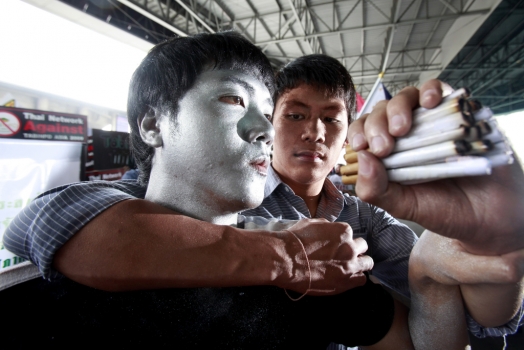 or, The Thai Anti-Tobacco Movement ROCKS. BIG TIME!
or, The Thai Anti-Tobacco Movement ROCKS. BIG TIME!
Until today, the biggest anti-tobacco protest (and I mean 'protest', as opposed to convention/conference) I'd ever attended was in Washington DC about 3 years ago. Of the 5,000 attendees at the 13th World Conference on Tobacco OR Health, about 200 of us marched through the streets of DC (with a large police escort) to the White House, where we demanded (that's right, we demanded, dammit!) the US take serious action against tobacco, including long overdue ratification of the FCTC (which, as far as I know, still has not been done). In any case, that whole trip -- the conference, the protest, the networking, etc. -- was incredible, BUT...
I just got 'home' from the biggest, best and most powerful anti-tobacco protest ever! And when I say 'powerful': If we're talkin' earthquakes, all previous protests (great as they've ALL been), have been 'minor tremors', barely registering on the Richter scale...and hardly noticeable by anyone, especially the tobacco industry (TI).
But this one rocked those bastards... and has triggered a tsunami that just might, with any luck at all, wipe them out!
In typical 'Errol' fashion, I was late getting to the protest site this morning. With many curious onlookers (including hotel staff), I loaded the Grim Reaper costume, the SICKARET and 3 placards into a taxi for the 5-minute drive to the convention centre (BKKCC). With the temperature in the mid to high 80s (yes, fahrenheit) and very high humidity, I'm hoping an Arctic front will blow in. No such luck.
Having scouted out the BKKCC area a couple of days earlier, I knew exactly where to go. And besides, I'd been reminded that, with 150 - 500 people protesting, I couldn't possibly miss it. Well, I missed it!
Not seeing any sign at all of a protest, I got the cabbie (who spoke virtually no English) to pull over. A security guard approached and, seeing my gear (especially the SICKARET) in the back seat, asked an unspoken question by putting his hand to his mouth in a smoking gesture. I said yes. He pointed and, in Thai, told the cabbie where to go, as it were.
A couple of blocks further and I see about 100 people (mostly highschool-aged kids) on the sidewalk... some in costumes (including less-elaborate [if I may be so bold] Grim Reapers, cigarettes, etc.), most carrying placards (in English and Thai)...and ALL wearing very cool t-shirts that say, "TOBACCO KILLS!" in big bold letters on the front and "5,400,000" (plus some other text) on the back. And there are at least 2, maybe 3 dozen helmet-wearing police officers. And I'm thinkin', "This is cool!"


 or, The Thai Anti-Tobacco Movement ROCKS. BIG TIME!
or, The Thai Anti-Tobacco Movement ROCKS. BIG TIME!